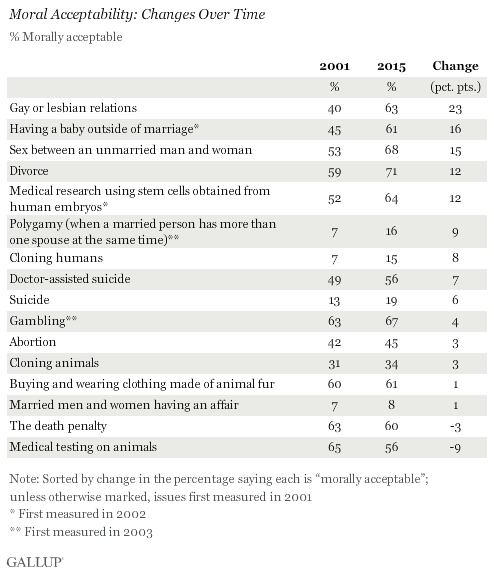Americans are moving left on the liberal/conservative spectrum when it comes to moral questions, by sizable growth in percentage points between 2001 and 2015, according to a Gallup poll announced yesterday.
Gay and lesbian relations showed the largest increase in Americans seeing them as morally acceptable, a jump of 23 percentage points from 40 percent in 2001 to 63 percent in 2015. The next highest jumps were in response to having a child out of wedlock (61 percent of Americans now find that acceptable, up 16 percentage points from 2001); sex between unmarried men and women (68 percent, up 15 percent); divorce (71 percent, up 12 percent) and the use of embryonic stem cells for research (64 percent, up 12 percent).
The only two issues on the list that Americans now find less morally acceptable are the death penalty – 60 percent find it morally acceptable, down from 63 percent in 2001 – and medical testing on animals – 56 percent, down 9 percent since 2001.
The implications:
Americans are becoming more liberal on social issues, as evidenced not only by the uptick in the percentage describing themselves as socially liberal, but also by their increasing willingness to say that a number of previously frowned-upon behaviors are morally acceptable. The biggest leftward shift over the past 14 years has been in attitudes toward gay and lesbian relations, from only a minority of Americans finding it morally acceptable to a clear majority finding it acceptable.
The moral acceptability of issues related to sexual relations has also increased, including having a baby outside of wedlock — something that in previous eras was a social taboo. Americans are more likely to find divorce morally acceptable, and have also loosened up on their views of polygamy, although this latter behavior is still seen as acceptable by only a small minority.
This liberalization of attitudes toward moral issues is part of a complex set of factors affecting the social and cultural fabric of the U.S. Regardless of the factors causing the shifts, the trend toward a more liberal view on moral behaviors will certainly have implications for such fundamental social institutions as marriage, the environment in which children are raised and the economy. The shifts could also have a significant effect on politics, with candidates whose positioning is based on holding firm views on certain issues having to grapple with a voting population that, as a whole, is significantly less likely to agree with conservative positions than it might have been in the past.
Posted by Cara Ellen Modisett

